The legal profession stands at a critical crossroads. Traditional marketing methods are rapidly becoming obsolete, replaced by sophisticated digital strategies that can make or break a law firm’s success.
So, what can we do?
SEO for lawyers is an absolute necessity for survival in a hyper-competitive digital marketplace.
Gone are the days when potential clients would flip through the yellow pages or rely solely on personal recommendations. Today’s legal consumers are digital natives, armed with smartphones, search engines, and an insatiable appetite for instant information.
They want lawyers who are excellent legal practitioners and digitally savvy professionals who understand their unique challenges.
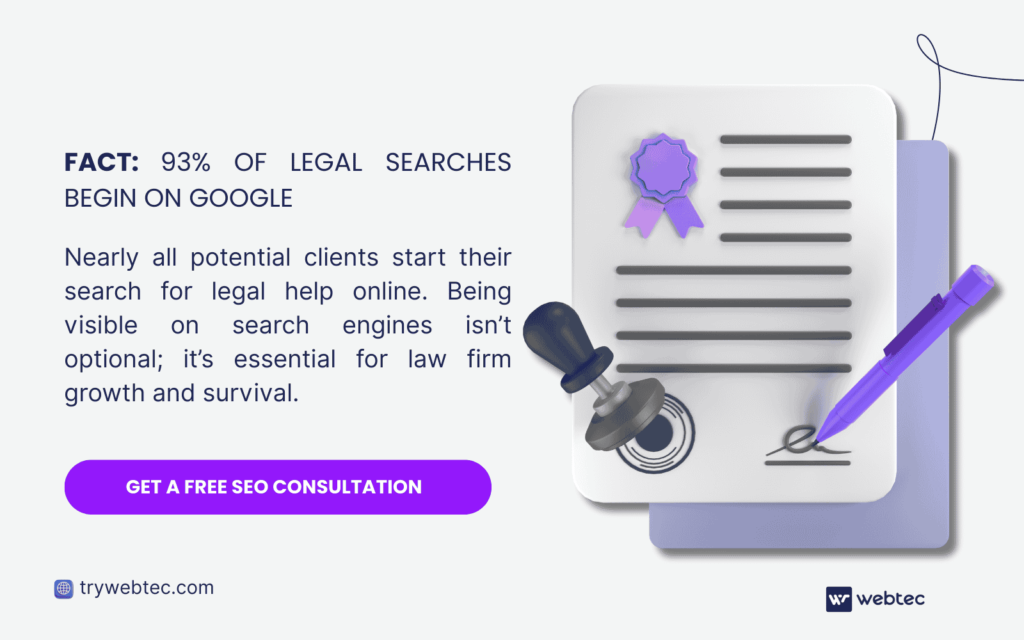
Twenty years ago, social media was just beginning to make its way into the social fabric, and a law firm’s reputation was built primarily through traditional means and basic search engine optimization services on search engines like Google.
Now, your online presence is often the first and most critical touchpoint for potential clients. A well-optimized website can attract more customers in a month than old-fashioned marketing might accomplish in an entire year.
Understanding SEO for Lawyers and its Complex Ecosystem
Search Engine Optimization (SEO) is a complex, multifaceted strategy designed to improve a law firm’s visibility in online search results.
For lawyers, this means creating a comprehensive digital ecosystem that attracts, engages, and converts potential clients through strategic online content and technical optimization.
Key Components of Legal SEO
The modern legal field demands a sophisticated digital approach beyond basic website presence.
Successful SEO strategies for law firms integrate multiple specialized components, each requiring careful optimization to capture client attention in an increasingly competitive online environment.
Technical Website Optimization
Digital infrastructure forms the bedrock of any successful law firm’s online presence. Modern legal websites require more than aesthetic appeal—they demand precision-engineered technological frameworks that communicate reliability, expertise, and accessibility.
Websites must function as sophisticated communication platforms that instantaneously convey professional credibility. This means developing web architectures that load with lightning speed, adapt seamlessly across devices, and provide intuitive navigation pathways.
Server-side optimization, advanced caching mechanisms, and responsive design principles become critical elements in creating digital environments that search engines recognize and potential clients trust.
Security protocols transform from optional considerations to absolute necessities. Law firms handle extraordinarily sensitive information, requiring robust encryption, secure data transmission channels, and comprehensive vulnerability management strategies.
Every technological decision becomes a statement of professional commitment to client protection.
Content Strategy and Meaningful Communication
Content represents the narrative heartbeat of digital legal marketing. Successful strategies transcend traditional informational approaches, creating comprehensive resources that educate, empathize, and demonstrate institutional expertise.
Effective legal content requires a nuanced understanding of potential client psychology. Each piece must address pain points, provide clear guidance, and establish trust through genuine, accessible communication.
This demands developing multilayered content ecosystems that include comprehensive guides, targeted practice area resources, frequently asked question collections, and multimedia explanatory materials.
Practice area specialization becomes crucial. Personal injury content differs dramatically from immigration law narratives, requiring sophisticated, tailored communication approaches recognizing unique client challenges and legal complexities.
Local Search Positioning
Local search optimization represents a mission-critical strategy for geographically anchored legal practices. Unlike broad digital businesses, lawyers serve specific regional markets, making localized digital marketing an operational imperative.
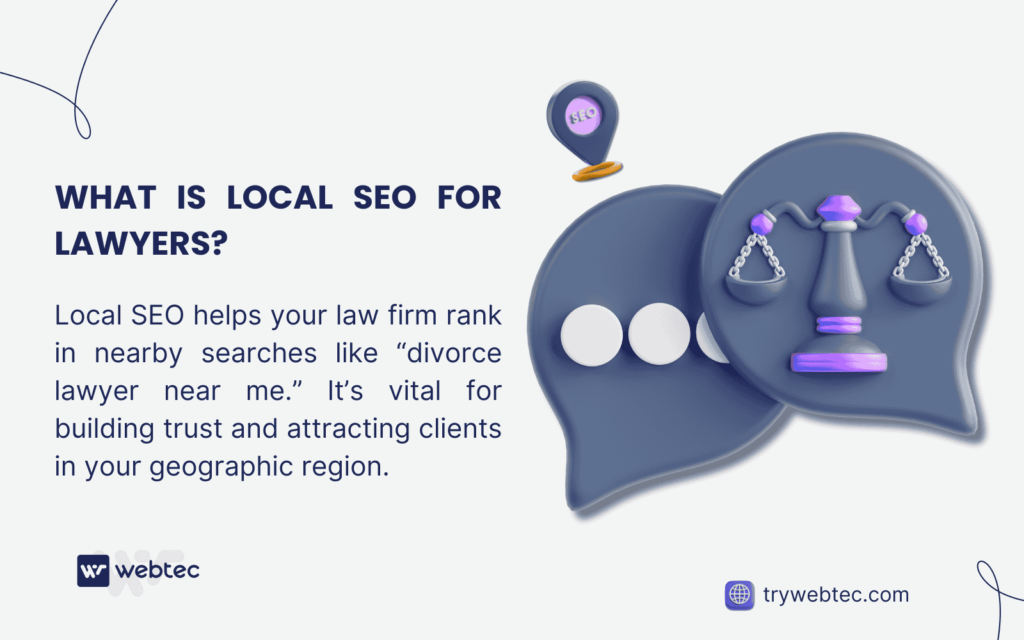
Comprehensive local positioning demands sophisticated Google My Business management, precise geographic content development, and strategic community engagement.
Law firm SEO services help create digital footprints demonstrating deep local understanding and highlighting regional legal nuances, community connections, and specialized expertise. Location-specific content becomes a powerful positioning tool.
Developing resources that address local legal challenges, explain regional judicial systems, and provide community-focused legal insights transforms digital platforms into genuine local information hubs.
Reputation Management
Digital reputation management extends far beyond traditional monitoring approaches. Modern legal practices require comprehensive strategies that track, shape, and proactively manage online perceptions across multiple digital platforms.
Sophisticated reputation engineering involves systematic review tracking, strategic response development, consistent brand messaging alignment, and proactive digital presence management.
Each online interaction becomes an opportunity to demonstrate professionalism, expertise, and genuine client commitment.
Crisis management capabilities emerge as critical components. Well-developed protocols for addressing potential negative feedback, managing online discussions, and maintaining professional digital representations become essential strategic assets.
User Experience Design
User experience transcends traditional web design, representing a holistic approach to creating digital environments that are intuitive, accessible, and genuinely supportive of potential clients navigating complex legal challenges.
Successful design integrates multiple sophisticated considerations: creating clear information hierarchies, developing stress-aware interface principles, ensuring comprehensive accessibility compliance, and providing seamless interactions across diverse device ecosystems.
Interactive digital elements must function as low-friction connection mechanisms.
Features like immediate case evaluation tools, direct communication options, and simplified contact pathways transform websites from passive information repositories to active client engagement platforms.
Strategic Digital Transformation
Digital marketing for law firms demands comprehensive, intelligent strategies that combine technological sophistication with genuine human-centered communication approaches.
Why SEO Matters More Than Ever for Legal Practices
The legal market has become increasingly saturated. With thousands of law firms competing for visibility, those who master digital marketing will survive and thrive. SEO provides several critical advantages:
- Increased Visibility: Rank higher in search results
- Targeted Client Acquisition: Attract clients specifically seeking your legal services
- Cost-Effective Marketing: Lower customer acquisition costs compared to traditional advertising
- Credibility Building: Establish authority in your legal niche
- 24/7 Marketing Presence: Your website works constantly to attract potential clients
Specialized SEO Strategies for Different Legal Niches
Different practice areas require tailored SEO approaches to reach and connect with potential clients. Each legal specialty presents unique challenges and client needs that must be addressed through customized digital marketing strategies.
Why Does SEO for Personal Injury Lawyers Matter?
Personal injury law represents a unique digital marketing challenge. Potential clients are often in vulnerable, high-stress situations seeking immediate help. Your SEO strategy must balance empathy with professional expertise.
Content Strategy Recommendations
- Create comprehensive guides about injury claims
- Develop FAQ sections addressing common concerns
- Share client success stories (with appropriate anonymization)
- Provide clear, compassionate explanations of legal processes
SEO for Bankruptcy Lawyers
Bankruptcy clients require a delicate, supportive approach. Your digital content and efficient search engine optimization services should provide hope, clarity, and practical guidance during challenging financial periods.
Effective Content Approaches
- Demystify bankruptcy legal processes
- Offer financial recovery resources
- Create step-by-step guides for debt relief
- Address emotional aspects of financial challenges
SEO for Immigration Attorneys
Immigration law demands nuanced, constantly updated content that navigates complex legal frameworks. Your digital presence must communicate expertise, empathy, and up-to-date information.
Digital Marketing Tactics
- Regularly update content on immigration policy changes
- Provide multilingual resources
- Create comprehensive visa and immigration process guides
- Share success stories and client testimonials
SEO for Criminal Defense Lawyers
Criminal defense SEO requires a strategic balance between professional representation and compassionate understanding. Your online content must demonstrate legal expertise and human empathy.
Strategic Content Development
- Explain legal rights and defense strategies
- Provide clear, non-judgmental information
- Address common legal concerns
- Showcase trial experience and success rates
SEO for DUI Attorneys
DUI SEO strategy represents a specialized field requiring targeted, informative content that educates and supports potential clients.
Digital Marketing Approach
- Create comprehensive DUI legal guides
- Explain potential consequences and defense strategies
- Provide clear, actionable legal advice
- Address client concerns with professionalism and empathy
Technical SEO Foundations for Law Firm Websites
The digital foundation of your practice isn’t merely an online presence. Behind the elegant interface clients see lies a complex technical framework determining whether search engines will prominently showcase your firm or render it invisible.
Website Infrastructure and Performance
Your website is more than a digital brochure or business card—it’s a sophisticated and powerful marketing machine and client acquisition tool.
Don’t take technical optimization as a luxury! It’s crucial for search engine rankings and user experience and is a foundation for modern legal marketing.
Performance Matters More Than You Think
Fast loading speeds are a client trust signal. Potential clients won’t wait around. If your site takes more than three seconds to load, they’re gone.
Mobile responsiveness is another area that isn’t optional anymore. Most legal searches happen on smartphones, period.
A secure HTTPS connection tells potential clients that you take digital security seriously. Clean, intuitive site architecture means visitors can find the information needed without getting frustrated.
Accessibility
ADA compliance does more than meet legal requirements. It shows your firm understands diversity and inclusivity. You’re practicing law and demonstrating professional integrity.
Schema Markup for Legal Services
Schema markup or structured data gives Google a detailed, organized snapshot of YOU to show what you offer to the right people.
If someone is looking for a “divorce lawyer near me”, Google can use the information to say, “Hey, this law firm specializes in divorce, and it’s right in your area!
It improves visibility, generates higher click-through rates, makes your link stand out, and builds a better overall user experience.
Quality Content
Forget generic marketing language. Your content needs to solve real problems. Potential clients want expertise, not sales pitches. They’re after clear, actionable information that helps them understand their legal challenges.
Content remains the cornerstone of effective SEO. However, for lawyers, it must transcend traditional marketing approaches.
What Makes Content Work
Depth trumps word count. Your content should provide comprehensive insights that go beyond surface-level explanations.
This will keep readers hooked and drive user engagement metrics through the roof. They tell the real story—are people reading and interacting with your content?
But this won’t happen until we produce relevant blogs using everyday language to help people who face legal issues. Ditch the legal jargon. Write like you’re explaining things to a friend who needs help.
That’s not the end of the story, though! Regular updates matter. A stale website looks like a stale law practice. Consistent, valuable content signals that your firm is active, current, and engaged.
Your digital presence is your first impression. Make it count. It’s not about possessing a website—it’s about having one that works.
What is Local SEO for Lawyers? Dominating Your Geographic Market
Most people looking for a lawyer want someone nearby who understands their specific situation. Local search optimization is how you make sure potential clients can find you when they need help.
Local search optimization represents a critical strategy for law firms. Most legal services are inherently location-based, making geographic targeting essential.
Google My Business
Your Google Business Profile is way more important than most lawyers realize. Think of it as your online business card but with special powers. Incomplete or outdated information is like having a front door with peeling paint. Nobody wants to walk in.
Keep your profile fresh. Regular updates and posts are essential. Add recent photos, update your services, and share what makes your firm different. Professional, current profiles stand out.
Content That Speaks to Your Community
Generic legal content is dead. Lawyers must create resources that feel like they’re talking directly to residents. Write about local legal challenges. Discuss neighborhood-specific issues. Share insights that prove you understand this community’s unique legal structure.
Beyond Getting Found
Local SEO isn’t about ranking first. It’s about becoming the lawyer people trust before they even call you. Show you’re a local resource that genuinely cares.
Building Your Online Reputation the Right Way
Your online reputation represents the cornerstone of digital credibility in today’s legal marketplace. Strategic reputation management goes beyond monitoring mentions to actively shaping how potential clients perceive your practice online.
Link Building
Link building is about proving you’re the real deal online. One quality link from a respected legal source beats a hundred random, worthless ones.
However, link-building for lawyers requires a strategic, ethical approach that focuses on those that matter.
Forget about spamming blogs with your website link. When you write for legal publications or jump into professional forums, you’re showing you know what you’re talking about.
The best content gets shared because it’s genuinely helpful. Create resources that make other lawyers think, “Wow, I wish I wrote that.” Plan practical guides, research that breaks new ground, and insights beyond textbook legal advice.
Professional Connections That Matter
Building relationships with legal publications takes work, but it pays off. These connections create natural link opportunities that don’t feel like cheap marketing.
Online Reviews For Building an Excellent Reputation
Potential clients trust online reviews more than your fancy website or slick advertising. Your reputation is built online, period. One bad review can tank your credibility faster than you can say “objection.”
A comprehensive reputation management strategy is crucial.
Managing Reviews
Collecting reviews is about doing incredible work that clients want to tell everyone about. When someone takes time to leave a detailed positive review, you’ve truly made a difference in their life.
Responding to reviews—good or bad—shows you’re paying attention. A smart response to a negative review can turn a potential reputation disaster into a trust-building moment. Ignore reviews, and you might as well close your practice.
SEO for lawyers is about building an online presence that reflects your legal expertise. Your reputation is everything—online and offline.
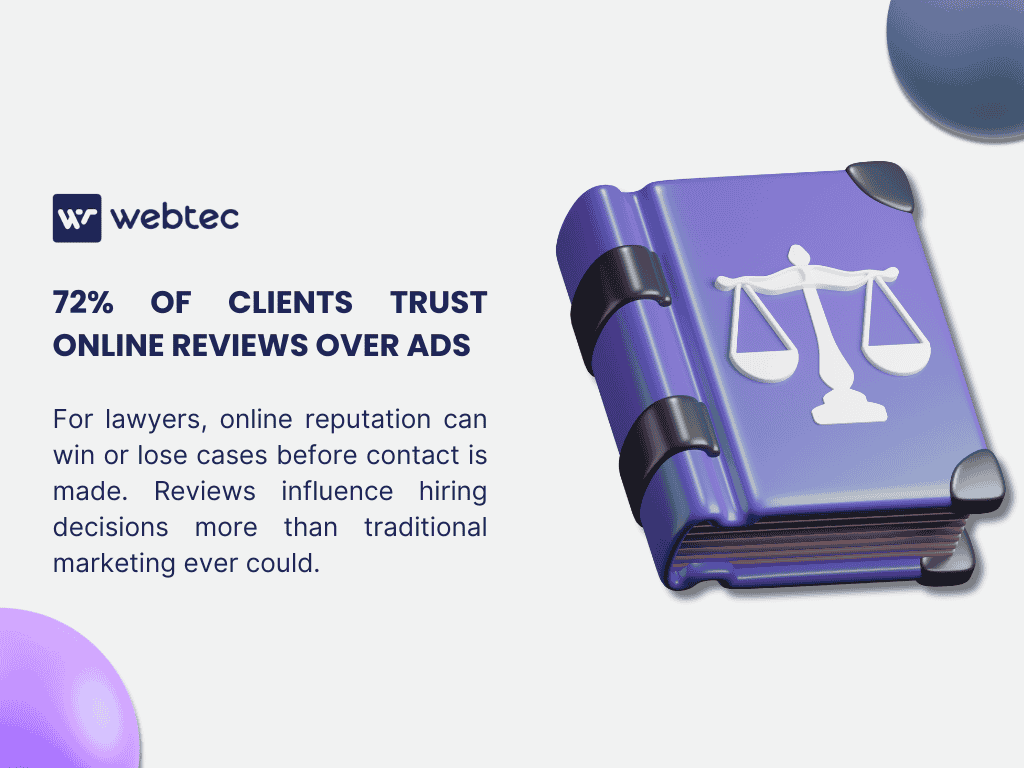
Measuring SEO Success for Law Firms
Tracking the right metrics with a qualified SEO agency for lawyers helps law firms understand their digital marketing effectiveness and make data-driven decisions.
Organic Search Rankings
Organic search rankings represent the fundamental pulse of a law firm’s digital visibility. Unlike paid advertising, these rankings reflect the genuine credibility and relevance of a legal website in the complex digital ecosystem.
Each position gained is a direct pathway to potential client engagement.
Understanding organic rankings requires deep dive analytics beyond surface-level positioning. Law firms must examine nuanced metrics like keyword diversity, search intent matching, and competitive landscape positioning.
This means tracking overall rankings and comprehending how specific practice area keywords perform, identifying emerging search trends, and mapping the intricate algorithms that determine digital visibility.
Sophisticated ranking analysis involves comprehensive monitoring across multiple search platforms, understanding localized search variations, and developing strategies beyond traditional optimization techniques.
It’s about creating a dynamic digital presence that adapts to evolving search engine algorithms and potential client search behaviors.
Website Traffic
Website traffic represents potential client interest and engagement. For law firms, quality trumps quantity in every digital interaction.
Sophisticated traffic analysis requires granular examination of visitor behaviors.
This means understanding how many people arrive at your website and how they interact with content, which pages generate the most engagement, and what specific legal challenges drive their online searches.
Heat mapping, user journey tracking, and advanced analytics tools transform raw traffic numbers into actionable strategic insights.
Different traffic sources demand unique interpretations. Organic search traffic carries different implications compared to referral or social media traffic.
Law firms must develop nuanced strategies that recognize the unique value of each traffic channel, creating targeted content and optimization approaches that speak directly to specific visitor segments.
Conversion Rates
Conversion rates represent the critical junction where digital visibility transforms into tangible client relationships. For law firms, a conversion is the initial step of a potentially life-changing legal journey.
Comprehensive conversion rate analysis involves mapping intricate user interactions, understanding psychological triggers that motivate potential clients to reach out, and creating seamless digital experiences that reduce friction in the client acquisition process.
This requires sophisticated tracking of multiple conversion points: phone call initiations, email inquiries, consultation requests, and downloadable resource interactions.
Successful conversion optimization demands continuous experimentation. A/B testing of landing page designs, call-to-action language, and user interface elements becomes crucial.
Law firms must develop agile digital strategies that quickly adapt based on real-time performance metrics.
Cost Per Lead
Cost per lead represents the financial heartbeat of digital marketing strategies. For law firms with limited marketing budgets, understanding the economic efficiency of digital efforts becomes paramount.
Calculating cost per lead requires a holistic economic analysis. This goes beyond the simple division of marketing spend by lead volume. Sophisticated approaches examine lead quality, potential case value, practice area specifics, and long-term client lifetime value.
A high-cost lead in complex litigation might represent significantly more value than multiple low-cost leads in minor legal matters.
Advanced cost-per-lead strategies involve multi-channel attribution modeling, understanding the intricate pathways potential clients take before converting, and developing targeted marketing approaches that optimize both acquisition costs and potential revenue generation.
Client Acquisition Metrics
Client acquisition metrics provide a comprehensive view of digital marketing effectiveness, tracking the entire journey from initial online interaction to signed engagement.
This approach requires sophisticated tracking systems that follow potential clients through multiple touchpoints.
It’s about how many people visit a website and understanding the complete conversion funnel: initial search, website interaction, consultation scheduling, and final client retention. Each stage provides critical insights into marketing strategy effectiveness.
Successful client acquisition analysis involves developing predictive models that anticipate potential client behaviors, identify optimal marketing channels, and create increasingly refined targeting strategies.
This means leveraging advanced data analysis techniques, machine learning algorithms, and continuous performance monitoring.
Analytics as Strategic Intelligence
Digital marketing metrics for law firms are strategic intelligence tools that provide nuanced insights into potential client behaviors, marketing effectiveness, and competitive positioning.
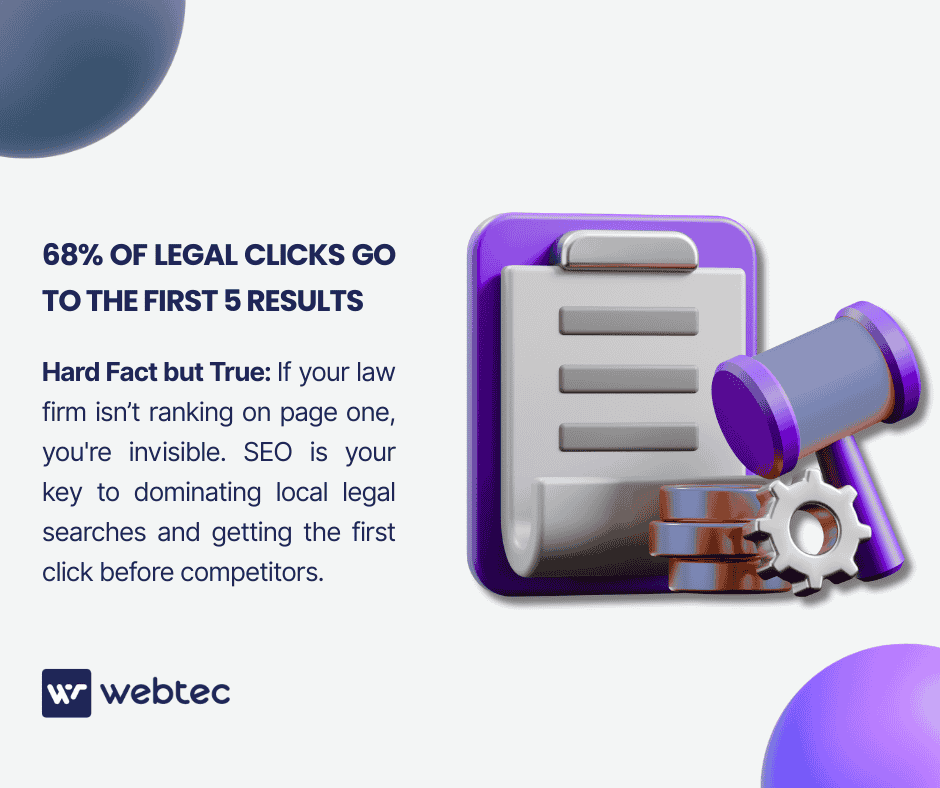
Choosing the Best SEO Company for Lawyers
Most SEO companies have no clue how legal marketing works. Picking the wrong partner can waste your money and tank your online visibility. You need someone who understands the specific challenges of marketing legal services and demonstrates specialized expertise.
The Right SEO Partner
Legal industry experience is essential. A generic digital marketing agency will burn through your budget without delivering real results. You need specialists who understand how potential clients search for legal services.
But that’s not all! Transparent reporting means more than monthly spreadsheets. You want an agency that breaks down exactly what they’re doing, why they’re doing it, and how it connects to actual client acquisition. No black box nonsense or technical jargon!
Lack of transparency often means:
- They don’t know what they’re doing
- They’re using tactics they don’t want you to understand
- They’re hiding ineffective or potentially harmful strategies
Customized strategies are non-negotiable. Cookie-cutter approaches are marketing malpractice for law firms. Your work is unique, and your digital marketing needs to reflect that.
The make-or-break deal, however, is their track record. If they haven’t delivered in the past despite getting many opportunities, chances are their words are empty promises.
Ask the agency you’re negotiating with to show you concrete, verifiable results like specific improvements in search rankings, website traffic, and—most importantly—client acquisition for their customers.
Real data is key to helping you understand how they function and whether they can deliver what’s expected.
Additionally, inquire about their marketing practices. Black hat techniques might generate short-term gains, but they can get your website penalized or delisted by search engines. Prioritize high ethical standards like those of your legal practice, and you’ll keep winning.
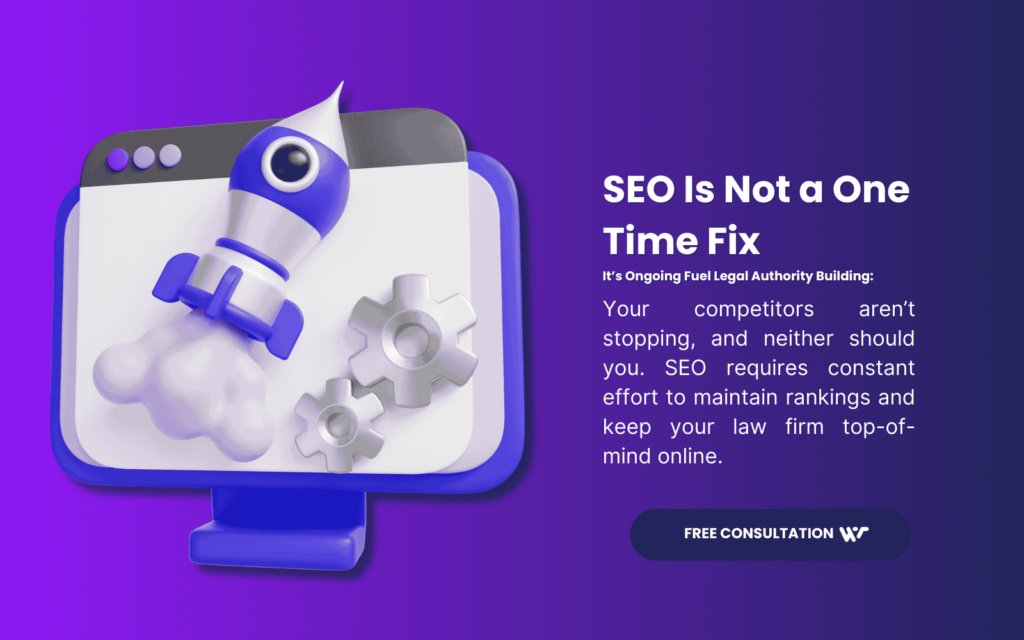
Red Flags That Should Make You Run
Beware of agencies making unrealistic statements. “Guaranteed first-page rankings” is a massive warning sign. Legitimate SEO professionals know that search results depend on multiple complex factors.
Secondly, one-size-fits-all approaches are a recipe for failure. If an agency tries to sell you the same strategy it uses for restaurants or retail shops, walk away. Legal marketing requires specialized expertise.
What’s more, some SEO “specialists” still rely on outdated optimization techniques that may have worked two years ago but can no longer support your vision. These include keyword stuffing, low-quality link building, and generic content.
Modern SEO is about:
- Creating genuinely valuable content
- Understanding user intent
- Building authentic online authority
- Providing real value to potential clients
Common mistakes can derail a law firm’s digital marketing efforts. Understanding potential challenges helps develop robust strategies.
What a Real SEO Partnership Looks Like
The best SEO companies act like an extension of your law firm. They’re strategic partners who understand your business goals and should be able to explain complex digital strategies in plain language you can understand.
Choosing an SEO partner isn’t about finding the cheapest option. It’s about selecting a team that genuinely understands how to connect your legal expertise with potential clients online.
Future of Digital Marketing for Law Firms
Emerging technologies like artificial intelligence, voice search, and personalized search experiences will continue transforming legal marketing strategies.
Artificial Intelligence
Artificial intelligence is changing how law firms connect with potential clients. Machine learning can now dig through digital data and help firms create marketing strategies that feel like they’re reading a client’s mind.
Take chatbots, for instance. These aren’t your old-school automated response systems. We’re talking about smart interfaces that can handle initial client inquiries with surprising skill.
They effortlessly qualify leads, schedule consultations, and provide basic legal information. The real win? They reduce the massive administrative headache for law firm staff while giving potential clients a quick, helpful first touchpoint.
Voice Search Optimization
Voice search has completely flipped how people look for legal help. Most people aren’t typing anymore. They’re talking to their phones and smart speakers, asking meaningful questions in authentic language. Law firms need to adapt or get left behind.
This means creating content that sounds like an actual conversation without legal jargon. A potential client asking, “What do I do after a car accident?” needs a direct, clear answer—not a complex legal dissertation.
Personalization
Personalized content is everything. Clients expect digital experiences that feel like they’re made just for them.
Imagine a website that shifts its content based on what a visitor wants. You’ll see different information when searching for divorce-related help than someone investigating business litigation.
Advanced Data Analytics
Data analytics has become a game-changer. We’re not talking about basic visitor counts anymore.
These new tools can predict client behaviors, understand which marketing channels work, and help firms spend their limited budgets more intelligently.
Embracing the Technological Evolution that Matters
Digital marketing for law firms is about creating a digital platform that connects with potential clients. Success means thinking like your customers and implementing what they’d like to experience, not what you want.
Webtec’s Ready to Help You Grow Digitally
SEO for lawyers is a critical investment in your firm’s future. By developing a comprehensive, strategic approach to digital marketing, law firms can attract more clients, build credibility, and establish a dominant online presence.
Where Can I Find SEO Services for Lawyers?
Ready to revolutionize your digital strategy with the right law firm SEO agency and understand how SEO services for lawyers can skyrocket your growth? Webtec specializes in cutting-edge analytics and insights designed specifically for legal professionals. The SEO firm is dedicated to making you fly, so schedule your comprehensive digital marketing consultation today.



